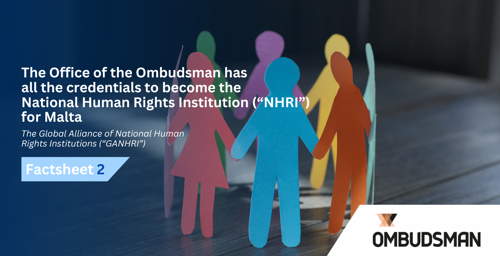
The Office of the Ombudsman has all the credentials to become the National Human Rights Institution (“NHRI”) for Malta - Factsheet 2
Published December 03, 2024
The Office of the Ombudsman has all the credentials to become the National Human Rights Institution (“NHRI”) for Malta - Factsheet 2
Published December 03, 2024

The Global Alliance of National Human Rights Institutions (“GANHRI”)
A distinguishing feature of NHRIs is the existence of an international peer-review ‘grading’ system, which is recognised by States and international organisations as an authoritative assessment of the compliance of these bodies with the Paris Principles.
GANHRI is responsible for the accreditation process. It is really and truly the international peer alliance that supervises compliance of national institutions with the Paris Principles through its Sub-Committee on Accreditation (SCA), which undertakes reviews every five years, or sooner if there is cause for concern regarding the institution in question, and covers all aspects of NHRIs’ structure and functioning.
Malta does not have an NHRI.
To date, none of Malta`s institutions, not even the Office of the Ombudsman, are fully compliant with the Paris Principles and therefore none are eligible to submit a request for accreditation from GANHRI.
As far as the Office of the Ombudsman (“the Office”) is concerned, this is not possible solely because of the state of the law as it stands at present. One has to acknowledge the fact that in particular during the past months, the Office has not only publically advocated in favour of the need for Malta to have an NHRI but also insisted that it has all the credentials to become the NHRI of Malta.
Independent and effective NHRIs are considered to be a “jewel” of the human rights system because they introduce into the domestic scenario of every country obligations that make a difference in the lives of people and help safeguard democracy and the rule of law, by holding Governments to account through their investigations. They also promote, facilitate and bridge the positions of Governments with civil society and other organizations with the sole target of ensuring the day-to-day respect of human rights and prevent violations.
Over the years, the Paris Principles, and their interpretation by the SCA, have shaped the development of NHRIs worldwide. Intervention by the SCA has in concrete terms obliged States to modify their legislation in a way that it conforms fully with the Paris Principles.
In accordance with the UN Paris Principles and the statute of GANHRI, there are two levels of accreditation, each of which gives members a different level of participation in the international system:
- “A Status” - These are voting members that comply fully with the Paris Principles. NHRIs with “A” status can participate as full voting members in the international and regional work and meetings of NHRIs. They may also hold office in the ICC Bureau. They may participate in sessions of the UN Human Rights Council and may take the floor under any agenda item.
- “B Satus ” - These are observer members that are not fully compliant with the Paris Principles or have not submitted sufficient documentation for the ICC to make an accreditation determination. NHRIs with “B” status may participate as observers in the international and regional work and meetings of NHRIs. They cannot vote or hold office within the ICC Bureau. The United Nations does not give them NHRI badges, and they do not have the right to take the floor during sessions of the UN Human Rights Council.
This GAHNRI document shows the world scenario at present as far as accreditation is concerned.
One must point out that NHRIs are encouraged to apply for accreditation because it provides the NHRI with recognition and credibility, provides NHRIs the ability to participate in the international human rights protection structure, and it may grant the NHRI more influence in its home State.
NHRIs have broad mandates to look at human rights issues relating to all bodies that have some kind of public authority. Apart from the obvious, that is being neutral, impartial, independent and accountable, an NHRI must have operational independence. This comes about when the NHRI is given the legal right to conduct “own initiative” investigations, without waiting for a complaint to be filed. This option is particularly important, given that victims of human rights violations may never complain or contact an oversight institution for fear of reprisals. Another aspect is the ability of NHRIs to decide how they conduct their work, how they spend their time and money, what procedures they use for investigations, and how they plan their activities.
Please Wait
Processing
Operation Completed